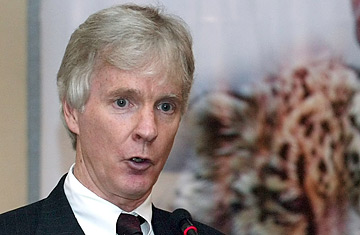
U.S. Ambassador to Iraq Ryan C. Crocker
Listening to Administration officials in Washington this week, you'd be forgiven for thinking Iran is an incorrigible hegemon, making violent mischief in every corner of the Middle East in order to drive the U.S. out of the region. Iraq is often presented as Exhibit A in the indictment of Iranian malfeasance. And yet, the outlook appears a little different from the U.S. embassy in Baghdad.
Although the Iranian officials with whom U.S. Ambassador Ryan Crocker has met in recent months have shown little flexibility, Crocker has lately begun to suspect that Iran may have begun to heed U.S. demand that it desist from supporting and training Shi'ite militia fighters. Speaking to reporters in Baghdad, Crocker cited a virtual cessation of mortar and rocket attacks on the Green Zone — strikes that military officials had claimed were becoming more accurate because of help the shooters were getting from Iran. Crocker also pointed to the announcement by Shi'ite militia leader Moqtada al-Sadr calling for a cease-fire, which the ambassador suggested might have come at the behest of Tehran. (Iran may also have had a hand in brokering a truce between the two key Shi'ite militia groups, Sadr's Mahdi Amy and Badr Brigade of the Supreme Islamic Council, which is a key element of the Iraqi government.)
"We've seen some interesting developments over the last couple of months," said Crocker. "How is Iran tied to it all? Very hard for us to say."
There's little reason to believe Iran has had a change of heart about the U.S. presence in Iraq. But if what Crocker suspects is true, Tehran might be more responsive to U.S. pleas than its rhetoric suggests — though even for a seasoned Middle East diplomat like Crocker, who began his career as a foreign service officer in Iran, it's hard to tell.
"What are Iranian intentions?" Crocker asked. "It's a question very much on my mind." Still, even the murky indications he's sensing are enough to encourage Crocker to press forward with another round of stilted conversations with Iranian officials. Crocker expects the working group of U.S. and Iranian officials set up after the last ambassadorial meeting on Iraq's security situation to convene again, although no date has been set.
"It continues to be a mixed and cloudy picture," said Crocker. "Since it's a mixed picture, it's certainly a picture we want to stay engaged in."
